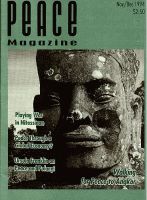
Peace Magazine Nov-Dec 1994, page 5. Some rights reserved.
Search for other articles by various here
Andrew Pakula (associate editor) sent me some copies of Peace Magazine. It has a remarkable spread of issues. Clearly Canada is the center of the world as far as communication is concerned.
I liked "Population Challenge" by Creighton and Feder July/Aug '94). It presented a difficult discussion in a very short space, as did the article on Burundi.
I do have some reservations about CBC Radio's As it Happens interview with Albie Sachs. It totally neglected the crimes of the ANC towards its internal dissidents and external competitors in the liberation movement: the killing of "dissidents" in the Angola camps by the ANC security police; murder of political opponents in South Africa from 1984 on; the "one location, one organization" policy of the internal ANC; and the murder of Stompie and the health secretary of AZAPO by Winnie's gang, the report of which is still secret. Punishing criminals who acted for political projects maybe a bad idea, but writing history and identifying misbehavior is necessary for a healthy future.
The peace movement should work out more concrete proposals to governments based on good knowledge of current armed conflicts and should present these to the public. The public will be interested in such proposals, but not in ideology. In the Netherlands, a fundraising campaign for Rwanda raised 60 million guilders in a week, last month, from a population of 15 million. The European Union paid for a radio transmitter in the Adriatic Sea to broadcast non-nationalist information to the territory of the former Yugoslavia-a good idea. There are many more good ideas that could be taken up, both for humanitarian reasons and to improve the state of international security using non-military means. They are more cost-effective than military means.
Herbart Ruitenberg, Foreign Affairs committee, Dutch Social Democratic Party; Board member, Dutch Helsinki Citizens Assembly
Nowhere in the "book review" of Petra Kelly's Nonviolence Speaks to Power (pp. 27-28) is it explained how Kelly met her death. As I understand it, she was shot by her partner, an ex-General, in a presumed murder-suicide (I have not read any follow-up analysis of the event). This extraordinary fate is not irrelevant to the problems she tries to face in her book. It raises serious questions as to whether any of what she (and some of us) hoped for is possible. It makes her a much more interesting, complex, and tragic figure than the apparent "saint" described in Moser's review. And it allows for a more incisive and critical view of her thinking.
Peter Nicholls, Professor of Biological Sciences, Brock University, St. Catharines, Ontario
My son Norm and I are under house arrest for joining the protest at Clayoquot Sound. We each have an electronic ankle shackle that is monitored through the phone line. We need permission toleave the apartment or alarms go off at the police station.
Norm has planted over a million trees and we've both been studying the forestry scandal in British Columbia for years. We joined the symbolic blockade for 10 minutes when it became clear that realistic alternatives were being ignored. I could never sing 0 Canada again unless I did stand on guard for the country. Later, we turned ourselves in, joining the other 850 defendants who impressed us with their honesty and intelligence. We have to let the NDP know that Mike Harcourt shouldn't encourage violence by calling environmentalists "crackpots." Call cabinet members or the premier, and your local member of the legislative assembly as well.
Irene Abbey, Vancouver

Peace Magazine Nov-Dec 1994, page 5. Some rights reserved.
Search for other articles by various here